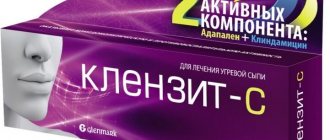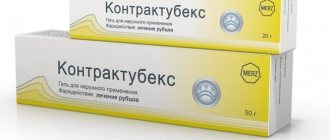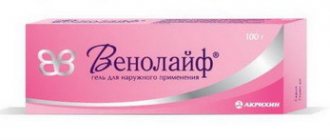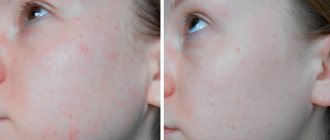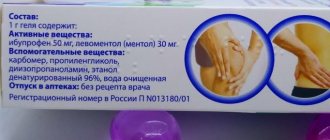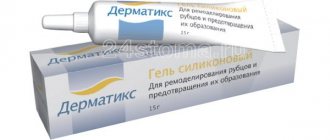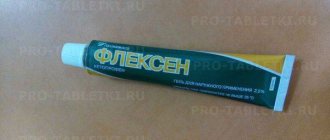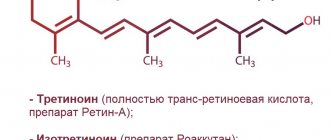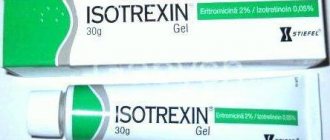July 30, 2021 Last revised: September 12, 2021 Medicinal products
To block pathogenic microflora in the mouth, a Russian manufacturer developed the drug Dentamet. The medicine belongs to a line of combined antimicrobial agents used topically in dentistry. Before using dental gel, you must read the instructions for its use, as well as analogues of the combined drug.
Release form and composition
The dosage form of Metrodent is a dental gel: colorless with a slight tint of yellow or a completely colorless homogeneous mass with a specific odor of menthol, or a specific odor of menthol and a faint odor of lemon, or strawberry, or pineapple (20 g each in aluminum tubes, 1 tube in a cardboard pack) .
1 g of gel contains:
- active ingredients: metronidazole benzoate – 0.016 g (this is equivalent to the content of 0.01 g of metronidazole), 20% solution of chlorhexidine bigluconate – 0.0025 g (this is equivalent to the content of 0.0005 g of chlorhexidine bigluconate);
- auxiliary components: propylene glycol, methyl parahydroxybenzoate, carbomer 934P, propyl parahydroxybenzoate, polysorbate 60, sodium saccharinate dihydrate, levomenthol, lemon, pineapple or strawberry flavoring, trolamine, purified water.
General information
Antimicrobial dental gel Dentamet is used to treat inflammation of the oral mucosa caused by the spread of infection. The drug is a white gel form, characterized by a uniform structure, packaged in volumes of 10 and 25 g in tubes made of aluminum material, placed in a pack of cardboard.
Uniqueness of the current composition
The medicinal properties of the combined substance Dentamet are realized due to the ratio of the two main components.
| Name of active substance | Amount per 100 g of gel | General information about the component |
| Metronidazole | 10.0 mg | An antibacterial substance that is a derivative of nitroimidazole |
| Chlorhexidine | 0.5 mg | Antiseptic in the form of a 20% solution of chlorhexidine bigluconate |
In addition to the main components, the highly effective gel substance is supplemented with glycerol, levomenthol, propylene glycol, trolamine, sodium saccharinate dihydrate and carbomer, dissolved in purified water.
Pharmacological properties
Pharmacodynamics
Metrodent is an antimicrobial drug for topical use in dentistry. The therapeutic effect of the drug is due to the combined composition of antibacterial components.
Metronidazole has antibacterial activity against anaerobic bacteria that cause periodontal diseases: Fusobacterium fusiformis, Prevotella intermedia, Porphyromonas gingivalis, Prevotella denticola, Wolinella recta, Borrelia vincenti, Eikenella corrodens, Selenomonas speciales, Bacteroides melaninogenicus.
Chlorhexidine is an antiseptic substance with a wide spectrum of action; gram-negative and gram-positive microorganisms, yeast, and dermatophytes are sensitive to it. Its bactericidal effect does not interfere with the functional activity of lactobacilli.
Pharmacokinetics
Local application of Metrodent practically does not cause its systemic absorption. The minimum concentration of active substances provides a local therapeutic effect without systemic effects.
Side effects
Due to the fact that the drug is applied locally, severe side effects can be avoided. It is extremely rare to experience discomfort in the oral cavity after applying the gel. A metallic taste may occur.
An allergic reaction occurs when there is intolerance to the components of the composition. Side effects of this kind manifest themselves in the form of burning, tingling, itching. When swallowing dental gel, symptoms such as nausea, dizziness, and less commonly, vomiting are observed.
Indications for use
According to the instructions, Metrodent is indicated for the treatment of infectious and inflammatory diseases of the oral mucosa and periodontal disease:
- aphthous stomatitis;
- inflammation of the oral mucosa caused by wearing dentures;
- chronic and acute gingivitis (inflammation of the gums) in edematous, hyperplastic or desquamative form;
- cheilitis;
- juvenile periodontitis;
- acute form of Vincent's ulcerative necrotic gingivitis;
- chronic and acute periodontitis;
- periodontal disease complicated by gingivitis;
- post-extraction alveolitis;
- periodontal abscess, periodontitis - as part of combination therapy.
Description of the drug
The use of mouth rinse solutions does not always bring a good effect if it is necessary to treat inflammatory processes. In such cases, it is appropriate to carry out complex therapy - rinses are used together with ointment or gel. The use of topical medications helps to combat swelling, bleeding, and pain in the teeth and gums.
Metrodent gel is classified as an antiseptic and antimicrobial medication. The drug is used for topical use and has proven itself to be the best. It has a strong preventive and therapeutic effect on the body. The therapeutic effect is obtained thanks to the active components included in the drug. The basis of the medicine is water, so it does not leave the mucous membranes and quickly penetrates into the depths of the inflamed tissues.
Instructions for use of Metrodent: method and dosage
Metrodent gel is intended for local application in the mouth and lips. You should not eat or rinse your mouth for 0.5 hours after the procedure.
The procedure should be carried out after preliminary sanitation of the oral cavity, including thorough brushing of the teeth, rinsing the mouth with a soda solution and wiping the gums with a dry cotton ball. Then, squeezing a little gel onto a toothbrush, you need to apply it to the gums and interdental spaces.
After removing plaque due to periodontitis, periodontal pockets should be treated with the drug, after which the gel should be applied to the gum area for 0.5 hours. The doctor prescribes the number of procedures taking into account the severity of the disease. The patient can then apply Metrodent to the gum area independently.
For the treatment of aphthous stomatitis, inflammation of the oral mucosa while wearing dentures, Metrodent gel should be applied to the affected areas of the oral mucosa, for the treatment of cheilitis - to the affected area of the lips.
To prevent exacerbations of chronic periodontitis or gingivitis, it is necessary to apply a pea-sized amount of gel to the gum area. Prevention should be carried out 2-3 times a year.
The frequency of use of Metrodent for the treatment and prevention of infectious and inflammatory diseases of the periodontium and oral mucosa is 2 times a day. Course duration is 7–10 days.
Immediately after tooth extraction, to prevent post-extraction alveolitis, it is necessary to treat the hole with gel, then it is recommended to use the drug independently 2-3 times a day for 7-10 days.
Gel Metrogyl denta: reviews
It should be noted that Metrogil-denta gum gel was the very first imported gel for gum inflammation, which appeared in Russian pharmacies after the collapse of the USSR. The composition of its active components and their concentrations have not changed since then, and, of course, it is not currently a super effective innovative product. However, when combined with other means, which we will discuss below, you will get a decent treatment result.
Advantages of the drug -
- good price/tube volume ratio,
- adheres well to the mucous membrane,
- antimicrobial activity is ensured by two components at once - the antibacterial effect of metronidazole and the antiseptic effect of chlorhexidine.
Disadvantages of the drug -
- does not have an analgesic effect,
- active components act only superficially, without penetrating deep into inflamed tissues,
- the concentrations of the active components are slightly lower than the effective therapeutic dosages (this is why the antibiotic gel is over-the-counter - because it is relatively harmless if used uncontrolled),
- the gel does not have a direct anti-inflammatory effect (it reduces inflammation only by suppressing microflora, and not by blocking inflammatory mediators in tissues), and why this is important - read below.
Important: the best treatment results are achieved if the products you use contain both antimicrobial components (such as metronidazole and chlorhexidine in Metrogil-dent) and components that have a direct, rather than indirect, anti-inflammatory effect. The direct anti-inflammatory effect is to block inflammatory mediators in tissues, and this effect is exerted by cetalkonium chloride, choline salicylate, phenyl salicylate, etc.
It is very rare to find drugs that simultaneously contain both antimicrobial and anti-inflammatory components. Therefore, the products are usually combined: gel + rinse. If your gel contains only anti-inflammatory components (for example, Cholisal gel), it must be combined with the antiseptic Chlorhexidine mouth rinse, which has a pronounced antimicrobial effect.
In turn, Metrogil-denta contains only antimicrobial components, and therefore, on the contrary, it must be combined with a rinse based on anti-inflammatory components. An example would be the Parodontocide rinse solution, which contains a whole range of direct-acting anti-inflammatory components - phenyl salicylate, essential oils of medicinal plants, allantoin and thymol (24stoma.ru).
Solution and rinse aid Parodontotsid –
At the link above you can familiarize yourself with the line of Parodontotsid preparations, among which there are two forms of the drug that can be used for rinsing the mouth. Firstly, this is a solution of periodonticide in the form of drops, which is intended for preparing a rinse. And secondly - a ready-made rinse aid that does not need to be diluted with anything. Next, we will tell you how to use Metrogyl denta gel for gingivitis and mild periodontitis.
Use during pregnancy and lactation
Due to the lack of information about the effect of Metrodent during pregnancy and lactation, it is recommended to avoid the use of the gel in the first trimester of pregnancy and during breastfeeding.
Prescribing the drug in the second and third trimesters of pregnancy is possible only in exceptional cases, if the expected therapeutic effect of therapy for the mother, in the opinion of the doctor, exceeds the potential threat to the fetus.
If you need to use Metrodent during lactation, you should temporarily stop breastfeeding.
Contraindications
Antimicrobial treatment is not prescribed to children under six years of age due to a lack of information about the safety of the drug and the degree of its effectiveness in childhood. Dentamet is contraindicated in patients who have a negative reaction to the components of the active composition or suffer from hypersensitivity to nitroimidazole.
Despite the lack of absorption of the active substance, gel therapy should be prescribed with caution to women during pregnancy. If the medication is necessary during breastfeeding, stop feeding for the duration of treatment.
When is Dentamet prescribed?
The choice of a remedy that acts locally is justified when inflammation of an infectious nature spreads through periodontal tissues, as well as the mucous membranes of the oral cavity. Dentamet is prescribed for the treatment of the following dental diseases:
- acute form of gingivitis, accompanied by ulceration and bleeding of the gums;
- chronic stage of pathology with overgrowth of gum tissue;
- acute course of ulcerative necrotic gingivitis, accompanied by rapid tissue necrosis;
- swelling of the gums with inflammation in the gum pockets due to infection;
- symptoms of progressive periodontal disease complicated by symptoms of gingivitis;
- signs of periodontitis (juvenile), acute form of the disease or chronic stage;
- development of aphthous stomatitis resulting from a defect in the mucous membrane;
- cheilitis, accompanied by cracks (transverse) lips, brightness of the red border;
- symptoms of alveolitis developing in the hole at the site of an extracted tooth;
- complex therapy of periodontal abscess is enhanced with Dentamet.
According to reviews from patients who have used the gel, the medication has virtually no drawbacks, except for not very fast action and a bitter aftertaste. The effectiveness of an inexpensive medicine increases markedly if you start using it immediately when a dental problem appears.

